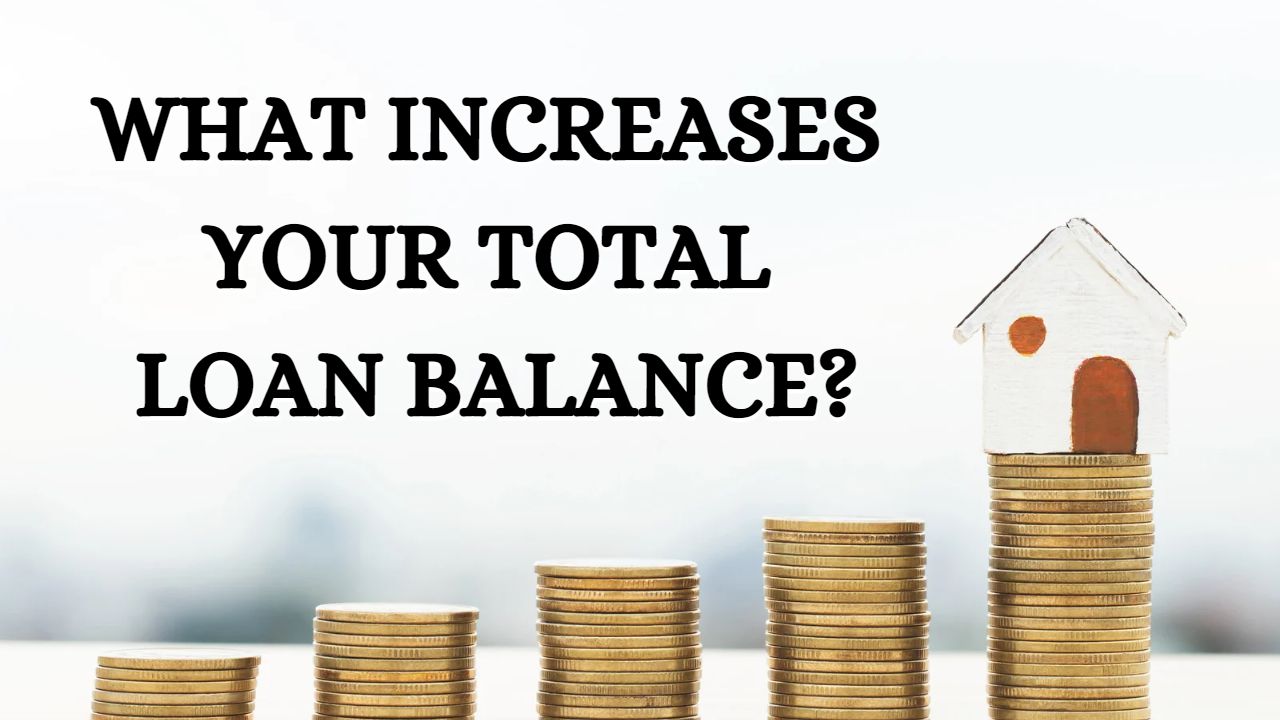The specific factors depend on the type of loan you have, but in this post we will understand what increases your total loan balance.

1. Interest:
Interest is an important component of most loans, and it refers to the cost of borrowing money. When you take a loan, the lender charges you interest as a percentage of the outstanding amount. As time passes and the loan remains unpaid, interest accrues and the total loan balance expands.
Interest Rates: The interest rate is the percentage applied on the loan amount, which determines the cost of borrowing. It is usually expressed on an annualized basis, such as 5% or 8%. Higher interest rates eventually adds up to total loan balance.
Compound Interest: In many cases, the loan attracts compound interest. This means that interest is calculated not only on the initial loan amount but also on the accumulated interest. The loan balance can grow more quickly over time due to compound interest.
Amortization: Loans are typically structured with a specific repayment term and a fixed monthly payment. These payments are usually divided into principal (the original loan amount) and interest. Initially, a large portion of the payment goes towards interest, while the rest goes towards reducing the principal. As the loan progresses, the interest portion is reduced, and more payments are applied to the principal.
Repayment Timing: The timing of your loan repayment also affects the extension of interest. If you make your payment later than the due date, the interest continues to accrue, increasing the loan balance. Paying before the due date can help reduce the interest earned.
It’s important to review the specific terms and conditions of your loan agreement to fully understand how interest affects your loan balance.
As understood interest is one of the most important factors. But the answer to the question what increases your total loan balance? does not end here.
2. Late Fees and Penalties:
If you fail to make your loan payments on time, you may be charged late fees or penalties. These additional charges are added to your loan balance, thereby adding up. Late fees and penalties are additional fees that lenders may impose when borrowers fail to pay back their loans on time or meet specific loan requirements. Here’s more detail on late fees and penalties.
Late payment fee: When you do not pay the loan by the specified due date, the lender may charge you a late payment fee. This fee is usually a fixed amount or a percentage of the missed payment and is added to your loan balance. The purpose of late payment fees is to encourage borrowers to make on-time payments.
Default penalty: If you consistently default on loan payments or fail to meet other loan obligations, you may be considered to be in default. Defaulting on the loan can result in more severe penalties, including higher fees, increased interest rates or legal action by the lender. These penalties can have a significant impact on your loan balance and overall financial situation.
Credit Score and Reporting: Late payments and defaults can have a negative impact on your credit score. When a lender reports your late payment to the credit bureaus, it can remain on your credit history for several years, making it more difficult to obtain credit in the future or getting you less favorable terms on future loans.
To avoid late fees and penalties, it is important to make your loan payments on time and meet all the requirements outlined in your loan agreement. In case you are facing difficulty in making payments, it is advisable to talk to your lender and explore possible solutions like loan modification or repayment plan before the penalty kicks in.
3. Loan Modification:
If you request a loan modification or restructuring, such as extending the loan term or adding missed payments to the balance, it can increase your total loan balance. Loan modification refers to the changes made to the original terms and conditions of a loan agreement.
Interest Rate Modification: A common type of loan modification is a change in the interest rate. The lender may agree to a lower interest rate to lower the borrower’s monthly payments or overall interest expense. By lowering the interest rate, the borrower’s total loan balance can gradually increase over time.
Term Extension: Another type of loan modification involves extension of the loan term. The lender may agree to extend the repayment tenure, which will result in lower monthly payments. However, increasing the loan tenure can increase the overall interest cost and increase the total loan balance.
Capitalization of fees: If there are outstanding fees, such as late payment fees or penalties, the lender may agree to capitalize them on the loan balance as part of the loan modification. This means that the fee is added to the principal amount, resulting in a higher total loan balance.
Repayment plans: Lenders may also offer repayment plans as a loan modification option. These plans restructure payment schedules to help borrowers catch up on missed payments. Missed payments are usually added to the loan balance and repaid over an extended period.
It is important to note that loan modifications are subject to terms and conditions set by the lender. Each lender may have different guidelines and criteria for approving loan modifications. Before undertaking a loan modification, it is advisable that you approach your lender, discuss your financial situation and understand the likely increase your total loan balance.
4. Fees and charges:
Some loans may have fees associated with them, such as origination fees or processing fees. These charges are usually added to the loan balance, increasing your total outstanding amount . The fees and charges associated with the loan can contribute to an increase in the total loan balance.
Origination Fee: Origination fee is a fee charged by lenders to cover the cost of processing and approving the loan. It is generally calculated as a percentage of the loan amount and is deducted from the loan proceeds. For example, if you have a $5,000 loan with a 2% origination fee, you will receive $4,900, and the remaining $100 will be added to the loan balance.
Processing Fee: Some lenders may charge a processing fee, which covers administrative costs related to reviewing and underwriting the loan application. These charges can vary in amount and are generally added to the loan balance.
Application Fee: In some cases, lenders may require borrowers to pay an upfront application fee. This fee covers the cost of evaluating the loan application but does not guarantee loan approval. If the loan is approved, the application fee is usually included in the loan balance.
Late Payment Fees: Late payment fees, as discussed earlier, are charges levied when borrowers fail to pay their loans on time. These charges are usually added to the loan balance, increasing the total outstanding amount.
It is essential to review the loan agreement and the fee schedule provided by the lender to understand the specific fees and charges associated with your loan. By being aware of these costs, borrowers can accurately assess their total loan balance and make informed financial decisions.
5. Missed or reduced payments:
This is another important factor to understand more on our topic what increases your total loan balance. Missed or Reduced Payments. If you miss a payment or pay less than the required amount, the unpaid portion gets added to the loan balance, thereby increasing. Also there would be impact on your credit worthiness. Understand more about what happens when you miss a loan payment
Missed Payments: When you fail to pay the loan by the due date, the unpaid amount is added to the outstanding balance. This is what increases your total loan balance. For example, if your monthly payment is $500, and you miss two payments in a row, the total amount owed will increase by $1,000. Interest may also continue to accrue on the unpaid amount, which will increase the loan balance.
Late Payment: Even if you make the payment after the due date but within the grace period, it can still be considered as late payment. In such cases, a late fee may be charged, and the additional fee is added to the outstanding amount.
Payment plans and modifications: In some cases, lenders may offer repayment plans or modifications to accommodate missed or short payments. These plans may allow borrowers to catch up on missed payments over an extended period of time, but it is important to understand how missed payments will affect the loan balance based on the specific terms offered by the lender.
It’s important to communicate with your lender if you anticipate having difficulty making loan payments. Discussing the situation and exploring possible solutions, such as a loan modification or alternative repayment plan, can help reduce the impact on the total loan balance and maintain a healthy financial position.
For more informative articles, please check DailyPostMan!
